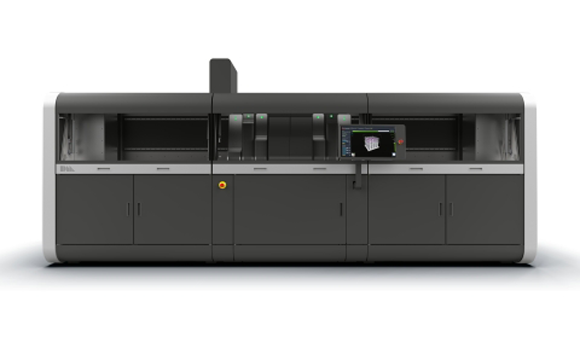DoD awards Desktop Metal $2.45 million for high-volume AM of cobalt-free hard metals

Desktop Metal, Burlington, Massachusetts, USA, has been awarded Phase I of a three-year $2.45 million project by the US Department of Defense (DoD) to develop an Additive Manufacturing process that is capable of mass-producing cobalt-free hard metals, developed by the US Army.
The company’s Production System™ with Single Pass Jetting (SPJ™), a proprietary binder jet Additive Manufacturing technology developed by Desktop Metal, will reportedly enable the mass-manufacturing of complex-shaped cobalt-free hard metal parts without tooling, and the project is expected to lead to the development of a dual-use technology with numerous applications in defence as well as in the civilian sector.
Desktop Metal stated that its new process has the potential to “change the landscape of the carbide hard metals market,” which is projected to grow to $24 billion by 2024, and is used in dual-use applications including cutting tools; abrasion and chemical-resistant nozzles; parts for the oil and gas sector; parts for the chemical and textile industry; tools used in agriculture and mining, the steel industry, consumer goods and sporting goods; parts for off-road transportation; parts for the aerospace and defence sector; parts for construction; and tools and dies for chipless material forming.
The project is issued to Desktop Metal by the US Army Contracting Command – Aberdeen, Research Triangle Park, on behalf of the US Army Research Laboratory (ARL) to the National Center for Manufacturing Sciences (NCMS) Advanced Manufacturing, Materials & Processes (AMMP) Consortium.
Successful investigations by the US Army in developing a novel iron-based nanomaterial as the matrix in WC-based hard metals, replacing cobalt, has reportedly resulted in the development of patented, novel Co-free WC-(Fe-Ni-Zr)-based hardmetals.
In alignment with the creation of the new material for commercial and DoD applications, the ARL has been in search of a cost-effective, high-volume process capable of manufacturing the new Co-free hard metals into complex, net or near-net shape parts without the use of any tooling.
The three-year project includes the following goals and requirements:
- Development of a feedstock and binder system for a novel cobalt-free hard metal
- Using the Desktop Metal SPJ process to build a sufficient quantity of components – at least 200,000 parts in one day from a single machine
- Delivery of a cost analysis for scaling up the advanced SPJ Binder Jetting technique to successfully manufacture at least 500,000 prototype pieces.
“The novel Co-free hard metal grade is expected to yield a high-strength, high-toughness, high-hardness, and high-wear resistance material,” stated Dr Nicholas Ku, Materials Engineer, CCDC Army Research Laboratory. “We believe combining this novel material with Desktop Metal’s Single Pass Jetting technology will have major applications not only in the defence sector but also in the commercial sector.”
Ku added, “Further, we believe this combined method will dramatically improve sustainability, reduce the use of a conflict mineral and provide an environmentally-friendly process to mass-produce parts with superior properties.”
Desktop Metal’s Production System leverages patent-pending SPJ technology to achieve build speeds said to be up to 100 times those of legacy Powder Bed Fusion (PBF) AM technologies, and deliver up to hundreds of thousands or even millions of parts per year at costs competitive with conventional manufacturing.
Whereas typical Binder Jetting processes use multiple carriages and passes over a build box to complete the steps required to build each layer, bi-directional SPJ on the Production System consolidates these steps into the motion of a single print carriage, dramatically reducing build time and removing wasted motions during AM to increase mechanical efficiency.
Dr Animesh Bose, vice president of Special Projects for Desktop Metal, and a Fellow of ASM International and APMI International, will serve as principal investigator of the three-year project.
Dr Bose commented, “The success in this project will not only provide the hard metal community with their eagerly desired Co-free hard metal solution but also result in the development of a tool-free processing technique capable of fabricating this class of materials into extremely complex-shaped parts at speeds that can rival most other high-volume manufacturing techniques, opening up new horizons in the area of hard metals and its applications.”
Lisa Strama, NCMS’ CEO, reported, “This effort exemplifies the ability of NCMS and AMMP to link cutting-edge technologies of non-traditional defence contractors with government agencies to meet existing needs and requirements. We look forward to the lasting impact this initiative will have within AMMP, the Army, and the broader community driving innovative Co-free hardmetal solutions across the services and industry at large.”
